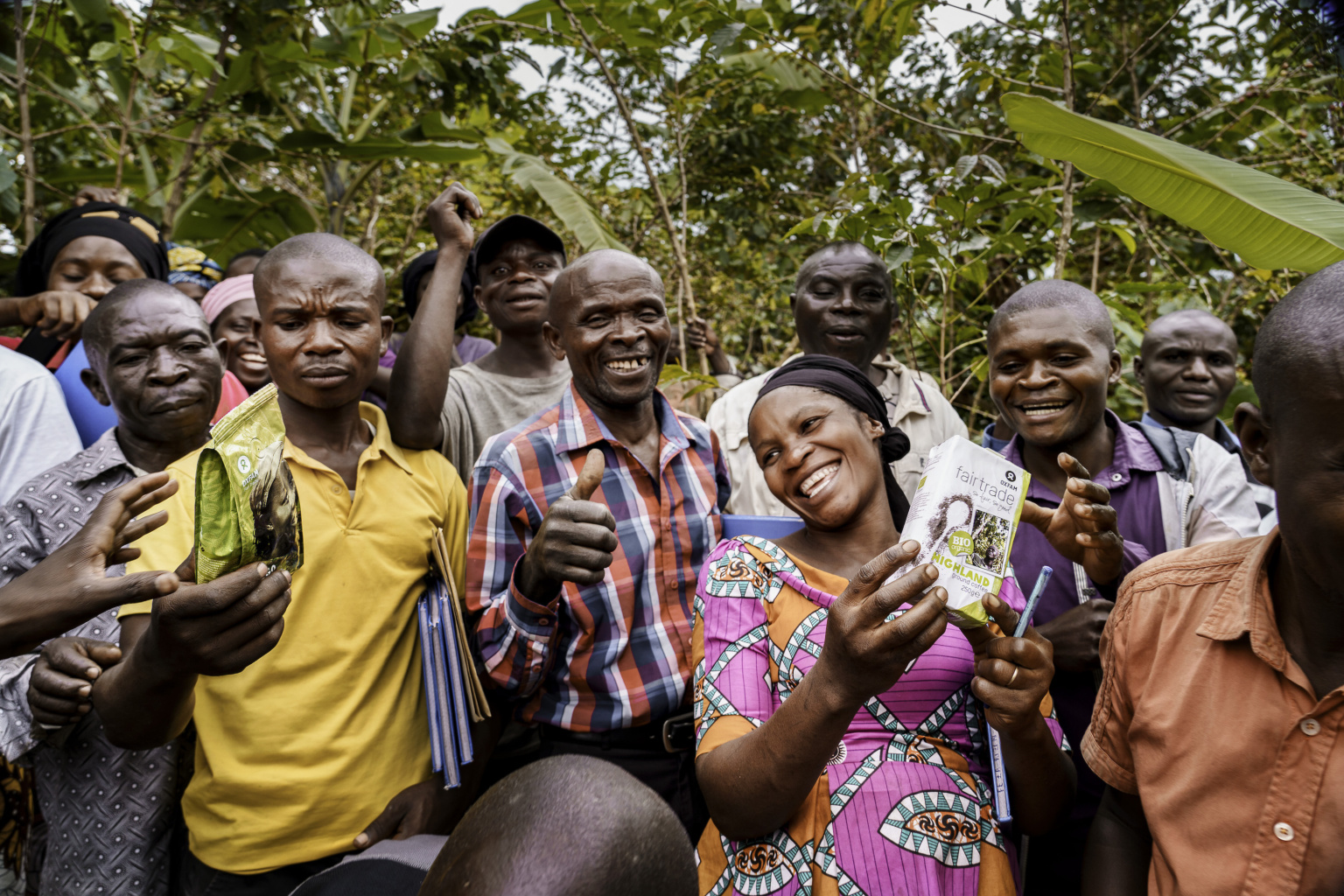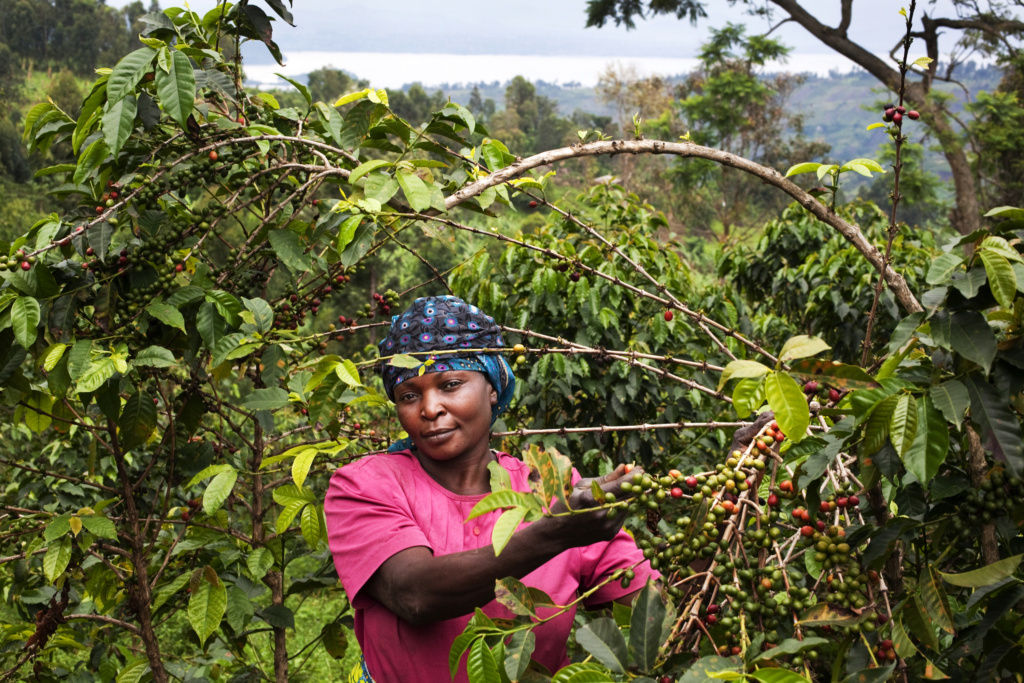
Why buy fair trade from Oxfam?
Via Oxfam Fair Trade you help build a more righteous world. You create opportunities for the people who produce your food and you show that fair trade regulations are important to you too.
When you buy fair trade products from Oxfam you can rest assured: you consume in an ethical way from beginning to end. Producers get paid a fair price for every product and they can count on a long-term collaboration. This gives them an increasingly strong position in the ruthless international trade for each passing year.
Fair trade: in the interest of producers
Oxfam Fair Trade trades fairly with its producers, mainly from the global South. In doing so we strengthen the organisation and market position of our trade partners.
The fair price we pay our producers is central, along with the fair trade premium they invest in their communities. But fair trade is much more than that.
- We work according to fair trade regulations that give everyone a chance to sell their products.
- We pay a price that contributes to a dignified income.
- We buy directly, with maximum transparency.
- We increase the knowledge and skills of underprivileged producers so they can compete on the international market.
- We respect people and the environment.
- We operate from a sustainable partnership with small-scale producers.
We are working hard on our impact. That is why …
Fair trade regulations that give every producer a chance
When you choose Oxfam you choose solidarity and respect. Oxfam not only trades with underprivileged groups of producers but also puts pressure on politicians and the industry to take measures in favour of these people.

Why? Because the current trade system regulations make it impossible for producers from the South to sell on our market at competitive prices.
This can be due to import taxes or subsidies that protect European farmers against cheaper products from the South. This unfair competition deprives farmers from Africa, Asia and Latin America of a fair chance to earn a decent living.
We believe governments must use their power to implement fair regulations that benefit all consumers and producers. They must implement regulations for the common good instead of just protecting the interests of large companies.
Fair trade contributes to a living income
Many producers find themselves in a weak negotiating position. Sometimes they are forced to sell their products to wholesalers that try to pay as little as possible in order to maximise their own profit margins.
Oxfam pays the international fair trade minimum price for the majority of its products. For food products that don’t (yet) have a fair trade standard Oxfam Fair Trade and the producers negotiate a fair price.
The fair trade minimum price: a fair price for every product
Independent certification organisations determine a fair trade minimum price for each product. This takes the nature of the labour, the efforts required and the producer’s purchasing power into account. Fair trade minimum prices also vary between countries, regions and qualities.
This minimum price is a recommended price. In practice fair trade organisations like Oxfam negotiate a price for each product with the group of producers. We never pay less than the minimum price but we do sometimes pay more. When the market price is higher than the fair trade minimum price we of course pay the higher of the two.
The fair trade premium: extra revenue for the community
Oxfam Fair Trade pays its partners a fair trade premium on top of the fair price. This is meant to stimulate the social and economical development of the whole community. The group of producers democratically decides how to use this premium. It is often invested in schools, health centres, roads, etc. Sometimes the premium is also used for education of the members and their families.
Oxfam offers producers an opportunity to earn a dignified income: compensation that covers production costs and also pays for sufficient food, clothing, housing, education and medical expenses for the family.
Direct trade with maximum transparency
Oxfam Fair Trade buys a large portion of the products directly from fair trade certified producers’ organisations. For example, we buy all of our coffee, the bulk of our chocolate, wine and fruit juice directly from the people who produce it.
For some products we work with intermediaries. This can be an organisation that unites and supports multiple groups of producers (e.g. Ecookim, a union of cocoa cooperatives in Ivory Coast) or a socially responsible organisation (e.g. a factory) that buys raw materials from local groups of producers and processes them into an exportable product (e.g. tea in bags).
Sometimes we also buy products or raw materials through another fair trade organisation. We only collaborate with organisations that are part of international unions such as the World Fair Trade Organisation (WFTO), FLOCERT (Fairtrade Labelling Organisation) or the European Fair Trade Organisation (EFTA). They guarantee that the purchases are made as directly as possible and 100% according to the fair trade principles.
In short, no matter how they arrive in the Belgian shops all Oxfam Fair Trade products are screened and approved by external certification organisations.
Investing in underprivileged producers
Trading fairly with producers generates a living income in the long term. But some need extra support to be able to trade on the international market. They can count on Oxfam’s support and advice in multiple areas. Everyone can make a financial contribution to this via our Partnerfonds.
That’s why we offer producers, among other things:
- support in obtaining fair trade or organic certification
- investment or bridge loans and advances
- training programmes about techniques, ecology, management, etc.
- support in product development
- advice about quality improvement
This support goes directly to producers who collaborate in democratically-run organisations (mainly cooperatives) and to producers who collaborate with a socially responsible company. This allows them to develop into strong organisations and it means the Oxfam contributions have a positive impact on the development of the entire region.
Respect for people and the environment
Oxfam Fair Trade only buys from producers who work in humane conditions. The working conditions may never violate the norms of the International Labour Organisation (ILO). They concern respect for health, freedom to unionise, equality on the work floor, prohibition of child labour, etc.
Fair trade is also a sustainable choice when it comes to ecology. Our producers use their natural resources wisely and use energy-saving production methods. Agro-ecological cultivation is the rule, not the exception. Did you know that more than half of the Oxfam Fair Trade range is organic?
Further along the production process we strive for environmentally-friendly transport and we have an efficient and sustainable policy on packaging and waste management.
Sustainable partnerships with fair trade producers
Oxfam supports cooperatives of farmers by bringing their products onto the market. To us farmers are not mere suppliers, they are equal partners.
So for us fair trade is never about a single purchase. Oxfam Fair Trade offers producers structural access to the market and guarantees them a long-term collaboration. They can count on Oxfam being there for them even after the next harvest.
Because producers who can be sure of sales – and thus an income – for a long period of time dare to plan and invest and can improve their expertise. In doing so, they improve their market situation and are able to develop in a sustainable manner.